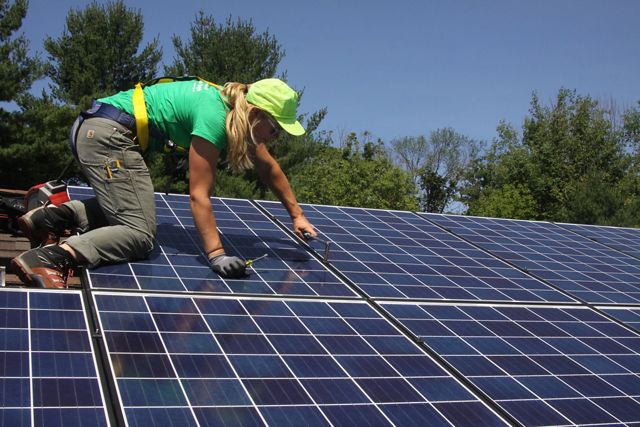U.S. tax policy can support climate and energy solutions, as well as land and water conservation all while continuing to support our nation’s charities.
Tax policy is a powerful tool for achieving policy objectives in the United States. Its effect on the charitable sector and on conservation activities has long been recognized, but the potential for tax policy to encourage farmers, ranchers and foresters to adopt practices that sequester carbon and reduce emissions has more recently emerged. Tax incentives are also critical for moving toward a clean energy economy and modernizing infrastructure. Based on its long history of advocacy for tax policy to support conservation, The Nature Conservancy (TNC) encourages Congress to consider several tax proposals to advance land and water conservation initiatives and an array of tax incentives to drive investments in climate solutions and clean energy innovation.

Key Tax Proposals to Encourage Land and Water Conservation
Increase the universal charitable income tax deduction available to all taxpayers. A broad, diverse coalition of charities has been working with Congress to increase and make permanent the so-called “universal charitable deduction,” or an “above-the-line deduction” to give all taxpayers an incentive for charitable giving.
Create a conservation capital gains incentive. Congress should make sales of land or an easement for conservation purposes exempt from federal capital gains tax. This would allow these landowners to eliminate the otherwise taxable capital gain from being subject to the tax and keep more of the sales proceeds. It would also enable conservation organizations and state and local agencies purchasing land or easements for conservation to stretch available dollars for such purchases.
Provide tax credits for landowner expenses related to nutrient management, carbon sequestration, soil health and/or green infrastructure for stormwater management. Provide enhanced tax deductions or tax credits equal to the costs and expenses for implementing these practices. A variation of this proposal would be to provide a federal income tax credit equal to the value of the crop insurance premium that is paid where the landowner has adopted and implemented approved nutrient reduction or soil health practices.
Advance tax incentives for private capital investment in green infrastructure projects, or in areas where working lands are a component of the landscape conservation plan. An investor could be offered a federal tax credit for a portion of investment return as well as a reduced financial return in exchange for the investor’s capital investment in a socially worthwhile project or activity, such as a natural infrastructure project that has environmental and societal benefits and a financial return on investment. Investors could compete for a fixed pool of credits or other incentives to ensure pricing discipline and to reward projects that deliver valued co-benefits. The Tax Cuts and Jobs Act of 2017 authorized tax benefits for investments in Opportunity Zones, or census tracts that meet certain poverty status thresholds. That program could be broadened to make conservation-compatible investments eligible for such tax benefits.
Support legislation to maintain the integrity of tax benefits for conservation easements. TNC believes the growing use of syndicated easements, which promises real estate investors aggressive tax deductions in exchange for modest cash investments, is wrong. Such tax shelters will endanger the thousands of legitimate conservation easements and the many landowners and conservation organizations behind them. TNC and the conservation community supports the enactment of the Charitable Conservation Easement Program Integrity Act to disallow a such abusive deductions and supports greater oversight by the Internal Revenue Service of syndicated easements.
Rectify adverse tax impacts facing conservation-minded landowners in numerous states. IRS regulations implementing the cap on the federal deduction for state and local taxes enacted under the 2017 Tax Cuts and Jobs Act was written so broadly that it adversely impacts more than 100 state-level tax credit programs in some 33 states, including many state-level conservation tax credit programs. The uncertainty created by this rule is already constraining conservation donations. Congress needs to enact legislation for the narrow purpose of exempting conservation donations from the TCJA’s state and local tax limitation.Congress should make sales of land or an easement for conservation purposes exempt from federal capital gains tax. This would allow these landowners to eliminate the otherwise taxable capital gain from being subject to the tax and keep more of the sales proceeds. It would also enable conservation organizations and state and local agencies purchasing land or easements for conservation to stretch available dollars for such purchases.

Key Tax Proposals to Encourage Clean Energy and Climate Solutions
Clean Energy Tax Credits. Tax incentives, such as the section 45 production tax credit, section 48 investment tax credit, and the 45Q carbon capture tax credit, have been critical for reducing emissions across the power, transportation and industrial sectors. Predictable incentives over longer periods will provide certainty and spur investments in clean energy generation. Layering additional incentives for clean energy development on brownfields or abandoned mine lands would direct clean energy projects away from sensitive habitats and aid economic revitalization of local communities. Reinstating or reforming tax credits, such as the 48C clean technology manufacturing credit and 30D electric vehicle tax credit, would provide critical support for manufacturing and deploying clean technologies in the United States. Congress should add flexibility, such as direct pay mechanisms in which project developers receive refunds for tax credits instead of relying on the tax equity market, to unlock capital for these investments with no additional costs to the government.
Incentives for Natural Climate Solutions. Farmers, ranchers and foresters interested in implementing practices to sequester more carbon on their lands face high up-front costs and uncertain returns on their investments. To reduce barriers to voluntary carbon market participation and increase deployment of natural climate solutions, TNC supports a tax credit that could compensate these landowners for development costs and reward demonstrated carbon sequestration in forests, agricultural lands and wetlands. The tax credit should be based on robust standards for monitoring, reporting and verification to ensure the benefit goes to landowners delivering actual results.



